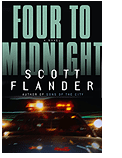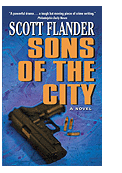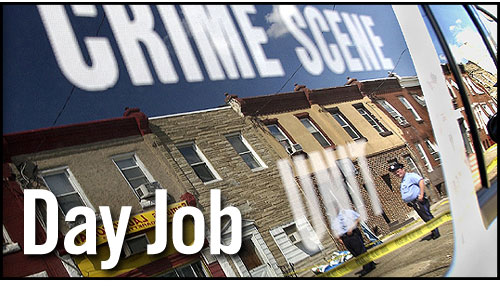  
|
|
 WHEN DUTY AND LOYALTY COLLIDE
Latino officers walk and talk a fine lineLoyalty to duty and culture often clash SOMETIMES, BEING a Latino cop in a Latino neighborhood can get a little complicated. Like the other day, when Officer Christina Bishnath went to a house in North Philly where a man reportedly had beaten up his girlfriend's 13-year-old daughter. When Bishnath arrived, it didn't look good. The girl had bruises on her legs, and she was cradling her wrist in obvious pain. Neither the man nor the girl's mother spoke much English, so it was fortunate that Bishnath was there. Bishnath, whose mother is Puerto Rican, speaks fluent Spanish, and she was quickly able to get everyone's story. The man even admitted to her that he had hit the girl. As other officers arrived, Bishnath took the girl out onto the sidewalk in front of the house. The plan was to take her to the hospital and lock up the mother's boyfriend. Just then, the mother came out of the house and spoke to Bishnath in Spanish. Don't tell anyone, she said—meaning, don't tell these other cops here - but my boyfriend is leaving out the back door. She was speaking from one Latino to another, and she clearly expected Bishnath to keep their little secret. But Bishnath would have none of it. "No, no, no, no," she told the woman, shaking her head. Bishnath called to the other officers, "He's leaving out the back door," and they all rushed in to grab the guy before he could get away. As they did, the woman gave Bishnath a look of surprise and disappointment—as if she had been betrayed. "Sometimes when I see that look," Bishnath said later, "I feel guilty, even though I'm just doing my job. But not that time—she was trying to pull a fast one on me." And that made Bishnath angry. "They want me to bend over backward and break the rules, just because we come from the same island. But I can't do that." Those few moments on the sidewalk revealed the paradox that Latino officers in Latino neighborhoods often face. On the one hand, they have a bond with the community that can be of tremendous value. But at the same time, many Latinos expect Latino cops to cut them a break, to show favoritism. Black officers in black neighborhoods have long encountered similar expectations. And years ago, when the city was full of new Irish, Italian and other immigrants, cops from those ethnic neighborhoods faced the same pressures. Now, it's the Latino cops' turn. As Philadelphia's Latino population has grown rapidly—44 percent just in the last decade—so has the need for Latino officers. There are now about 385 Latino cops in the city. In 1984, there were only 37. The infusion of new officers has clearly helped Latino neighborhoods get a better level of policing. But the new Latino cops are experiencing a pressure many never expected—the accusation of betraying their own people. There's an expression Latino officers often hear on the street: Tu eres Boriqua. It means: You're Puerto Rican like me. You understand what I have to go though. You understand the challenges, the difficulties. Bishnath and the other officers do understand. But when they lock people up or even just give out traffic tickets, they're often accused of turning their backs on the Latino community. And they hear a word that cuts to the bone: traidora—traitor. Officer Norma Troche still can't forget the first time she was called that. It was about two years ago, when she was fresh out of the Police Academy, assigned to the 25th Police District in North Philadelphia—the heart of the city's Latino community. And it happened just two blocks from where Troche grew up, in a crime-filled neighborhood where police have long battled drug dealers for the street corners. Troche and several other cops were locking up some dealers, and as Troche was putting handcuffs on one, a man rode by on a bicycle and screamed at her, Traidora! "They prepare you at the academy for being cursed at," says Troche, "but nothing hurt more than when I heard that." Still, Troche and other Latino officers in the 25th district say they've learned to deal with that attitude—as they must, if they're to do their jobs. And those interviewed said they'd much rather work in the 25th than anywhere else in the city. Because they understand not only the language, but the Latino culture, they're often able to resolve problems a non-Latino officer might not be able to. But Latino cops are also attracted to the 25th because, says Troche, they have "the feeling of being home." Her partner, Manny Serrano, who also grew up in the neighborhood, puts it this way: "You're with your own people." The 25th—which roughly runs from Roosevelt Boulevard down to Lehigh Avenue, and from G Street over to Broad—has the largest population of Latinos of any police district. Most of those families are from Puerto Rico, though there's a growing number of other Latinos, particularly Colombian and Mexican immigrants. And though crime has been declining there in recent years, as it has throughout Philadelphia, the 25th is still the city's busiest police district. Young drug dealers hang out on many of the corners, wearing their baggy pants and brown Timberland work boots, waiting for the next drive-up customer with Jersey tags. When police cars approach—even the unmarked ones, the dealers can spot those a mile away—the lookouts whistle, or call out an alert, like bajando!—coming down! Overlooking them, from giant murals, are the faces of dealers killed in the drug wars, their portraits painted onto graffiti-scarred walls. Every corner, it seems, has a memorial. R.I.P. Chico, Gabi, Raul. . . On block after block, narrow rowhouses are falling apart, or empty and boarded up. But the streets are as full of life as ever—kids tool around on their bikes, older people sit on their front steps and chat with neighbors, and Latin music and Mr. Softee tunes fill the air. Most of the 25th district's 45 Latino officers grew up here. And though they've since moved away (cops can't live in the district they patrol) they often still have family and friends in the neighborhood. Bishnath, who grew up around B and Allegheny, remembers that when she was a kid, the cops who responded to calls in her neighborhood rarely spoke Spanish, and they often couldn't determine what the problem was. "They wouldn't do anything for us," she recalled. "Whatever happened, they would shrug it off." Inspector Jose M. Melendez—one of the department's first two Latino lieutenants, and its first Latino captain and inspector—recalls that when he joined the force in 1968, he was forever crisscrossing the city to go where a Spanish-speaking officer was needed. Often, no one was available, and police had to find someone at the scene who spoke both Spanish and English, such as a family member or neighbor. With the influx of Latino cops, that's less of a problem these days. And that's made things easier for many Latinos. Most older residents, and many younger immigrants, speak little or no English. But even the ones who do would rather speak Spanish, particularly if they're in a tense situation. And it's not uncommon for an English-speaking Latino to immediately start speaking Spanish to a Latino cop. Often, says Troche, "It's a comfort." Officer Roberto Luciano, a Puerto Rican native who came to the United States five years ago, says that when he's called to resolve a "disturbance"—often a family dispute that can be anything from an argument to outright violence—his familiarity with the language and culture can help bring the situation under control. "It's like when a baby falls and cries, he wants his mom to lift him up from the ground and hold him," Luciano says. "They see in me the mother that's going to lift them up from the ground and shake them off. No fear, you're protected now." Some people, though—especially those who have committed a crime—may start speaking Spanish with a Latino officer, hoping to establish a rapport with him. "They'll try to mellow you out," says Troche. And many try to get the Latino officers to go easy on them. Officer Manuel Gonzalez says that when he writes traffic tickets, he often hears people say things like, "You're Puerto Rican like me. Why can't you let me go? You're not like the white guys." Even many law-abiding members of the community, he says, think Latino cops should cut their own people a break. He deals with that this way: "I have a mind-set. If you're committing a crime, you're committing a crime." Sometimes, being a Latino officer can have unexpected benefits. Especially when people make incriminating statements—in Spanish—not realizing that the cop standing nearby is Latino and understands every word. Troche remembers the time she was called to a bar that supposedly had been burglarized, and she listened to two female employees talk with each other in Spanish about how it was really just a scheme to collect insurance money. "They were trying to get their stories straight," says Troche, who later relayed the information to detectives. "As I walked out the door, I said to them in Spanish, 'Have a nice day.' Their mouths dropped open." Latino cops have another advantage in their knowledge of the culture, particulary when they handle domestic disputes. They're aware, for example, that among Latinos, it's not acceptable for a man—even if he's a cop—to go into a house and talk with the woman if the husband isn't present. If an officer knows how the husband's going to react when he finds out - and can talk with him about it—he might be able to keep the situation calm. Those cops who came from the neighborhood have an even deeper understanding of its residents. Troche, who's 28, grew up at 3rd and Indiana, which in that neighborhood is just about ground zero. Most of the boys she knew as a kid eventually got involved in drug-dealing at some point, she says—maybe as many as 85 percent of them. Many are dead, or in jail. Some are still on the street, like the guy who was brought into the police station in handcuffs one day. "When he saw me, he said, 'Norma, help me!' "I said, 'Carlos, what'd you get locked up for?' The other cop said, 'Carlos?' " It turned out he had given his name as Angel. Troche laughed, recalling the incident. "Sometimes they seek my help and I give them up." But there's sadness as well, she says. Not long ago, she ran into a young man she had grown up with. Two days later, Troche learned he was wanted for a homicide. "It broke my heart," she recalled. Ortiz, who grew up in the neighborhood, has arrested family members—and taken grief for it. "I've been berated at family functions," he says. "One time, one of my uncles called me up at night to tell me that what I did was wrong. He said, 'Blood is thicker than water.' " Despite the difficulties, the Latino cops of the 25th district are proud of how they're helping their community. They see themselves as role models to young people in the neighborhood, showing by example that it's possible to escape the downward pull of the barrio. And they feel they also help improve the image of the police department, which is often mistrusted. Says Troche: "When you're able to help somebody out—and in our language—whatever negative thoughts they have about the police, at that moment, it's all erased." Read the next story, HE STEALS PHILADELPHIA'S PAST. Home | Books | About Scott | Links |